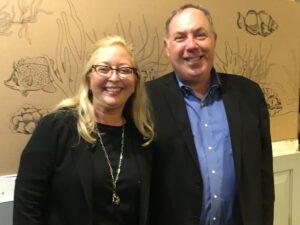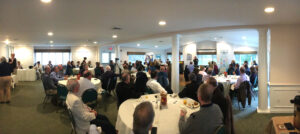Trish Kennedy, the Cape Cod entrepreneur who created the global technology company Back Office, spoke to a full house at November’s First Friday Breakfast Series about her new business, Zudy.
When they started out, Trish was a journalist and her husband Tom was a computer programmer. Together they started a computer and consulting company in Virgina, Kennedy and Associates, which they brought up to 10 million, and sold in 1992.

Trish thought they were all set, and scaled back when she had her kids. They had a non-compete clause, so they weren’t allowed to go into the programming, and retirement looked to be right around the corner.
Except it wasn’t. They came to Cape Cod, where Tom started BackOffice Associates in a 400 square foot office above the Orleans Whole Food Store. She did sales and he built the platform. They called the it Cranberry, and sold it to Johnson and Johnson, Merck, and others.
“And then we got the letter,” Trish said. They were being sued for trademark infringement by RIM, the company that had Blackberry. In fighting the case, Trish discovered you can sue anyone for anything. “They saw we were a small company, and took us to court to steal it away from us,” she said. “What they didn’t know was it wasn’t a small Cape company, it was a global company, located on Cape Cod. In the end, they agreed to buy the name from us, paid our legal fees, and ended up buying the product.”
“It’s a hard way to get a customer,” she said.
 They moved BackOffice to Harwich, into a building they renovated on Route 28. They hired on Cape Cod – where Trish says there is a lot of hidden talent (but won’t tell you where). They ended up selling the company to Goldman Sachs, who wanted to take them public. When Goldman bought them out, Trish said it was because “they didn’t think we were the right fit for our company.”
They moved BackOffice to Harwich, into a building they renovated on Route 28. They hired on Cape Cod – where Trish says there is a lot of hidden talent (but won’t tell you where). They ended up selling the company to Goldman Sachs, who wanted to take them public. When Goldman bought them out, Trish said it was because “they didn’t think we were the right fit for our company.”
“Now we have a lot of money,” she said. “I’m thinking now we retire…”
Except they don’t. Tom tells Trish there’s one more thing he has to do, and it’s called VINYL. Instead of tying the platform to an operating system, Tom wanted to build something completely agnostic, something so completely abstracted that it could sit on top of any data source or system. It had to be able to interact with those systems and build powerful enterprise applications. Trish said he wanted to be able to build all of that without any code, and build these applications in days.
And so he did.
It’s a declarative platform. There is a tiny kernel of code, and all the rest of VINYL is written in VINYL. Tom got it up and running, and Trish went out to do research.
She had a friend whose real estate company could use what they did, so she asked him to send the specifications to 22 top-rated companies and get a timeline and price. Eleven of those companies declined to bid. Those who responded came back with prices ranging from $180,000 to $1.1 million. The timelines to deliver ranged from 6 months to a year. “While his team was evaluating the responses, my husband, with VINYL, built the entire system – and gave the guy a couple things he didn’t know he needed,” Trish said.
How can the price ranges and timelines be so different? Trish said that the other bids were based on using code, so whatever they’re producing still requires resources and expertise most businesses cannot afford. Businesses spend a million dollars on a system, a system that requires someone with expertise to make changes.
“You have to have people who can speak that language if you build something with code,” Trish said. “With our platform, you go to your VINYL developer and whatever you forgot to put in gets put in immediately.”
They started selling VINYL to large clients, building a two year project in two weeks. Understandably, word spread.
The platform is VINYL, and the company is Zudy. Zudy, Trish says, “is how your brain connects to the platform – directly, instead of telling a programmer who translates it. Rarely you get what’s in your brain.”
She called the company Zudy because it’s short and had an available url. And when she typed it into Google, there was nothing. “Do you know how hard that is?”
Then came the branding.
“I’m a Patriots fan,” she said. “I talked to the Patriots and signed the contract for the backdrop for the press conferences. The next day we learned Tom Brady was going to be suspended. The first press conference is Robert Kraft on CNN, worldwide, with Zudy behind it. Our website crashed because so many people were hitting us.”
“If you’re going to innovate,” she said, “you have to take risks.”
Q&A
Once a customer signs on, how dependent are they on your team?
Customers take a three day training class. Once they’re using it for awhile they’re brought back for an advance class. Zudy also has solution architects which are business consultants. Trish said that VINYL allows companies take bigger risks. Fast failure lets companies try things they may not have tried otherwise.
What difference do you see on Cape Cod then and now?
“Harwich took a proactive approach with us. We are a known entity now so we get a little more attention, but when we first started in Orleans, we had no support from the town government,” she said. “In Harwich we saw the benefits of a town taking an interest in a technology business. Whatever is happening here, if you want technology, the towns have to support you.”
She also mentioned the need for infrastructure, making town government digital, and streamlining systems so they are less cumbersome and inefficient.
Does the lack of a four-year school make it hard to find talent?
“There’s a lot of hidden talent,” she said. “We have not found it a problem. We have the App Factory in the building in Harwich, where the average age is 24. They are really sharp people we’ve recruited from the Cape and just off the Cape. The reverse commute is not bad, although I advocate living on the Cape.”
Lo-code and No-code: is this a trend that’s going to continue?
“Don’t change your major. Learning how to think about data is critical. Just because it’s no-code doesn’t mean you don’t have to understand the systems. But I’d say the biggest problem with all these schools is the technology they’re training you on is 30 years old. Everything is different and everything is new. You should be constantly moving forward. You’ve got to pay attention and you’ve got to take those risks.”
How do you maintain security?
“Another piece to VINYL is it’s fully abstracted. We go into businesses and understand their security plans. Vinyl can sit on top of that, using their security. We don’t move any data or host any data. If you hacked into one of our apps, there wouldn’t be any data to find. That said, all VINYL apps are virtual, and they’re not really there.”
“We build a lot of stuff for companies that have tremendous security requirements. We grew up in the world of global enterprise, so when we built VINYL, we knew what we needed to do to play in that world. It works for Johnson & Johnson, and it works for local businesses. From a security standpoint, what we do is so different, firewalls etc. are not what we need.”
“It’s not about what your dream is,” she said in closing. “It’s about how hard you’re willing to work for it.”
